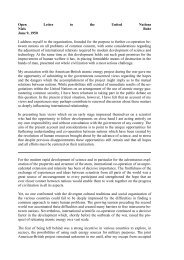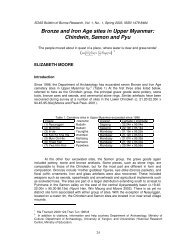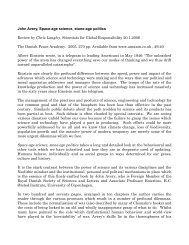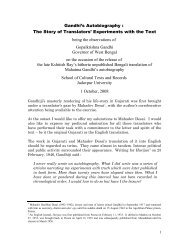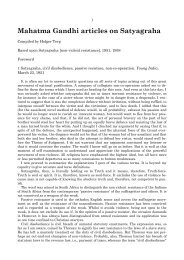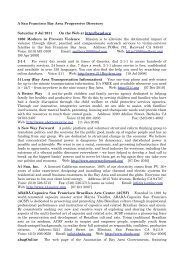THE SLAVERY OF OUR TIMES PREFACE / INTRODUCTION
THE SLAVERY OF OUR TIMES PREFACE / INTRODUCTION
THE SLAVERY OF OUR TIMES PREFACE / INTRODUCTION
Create successful ePaper yourself
Turn your PDF publications into a flip-book with our unique Google optimized e-Paper software.
people who cultivate other people's land, from which they may be driven at the whim<br />
of men who do not cultivate it. So that the existing right of landed property certainly<br />
does not defend the rights of the agriculturalists to enjoy the fruits of the labor he puts<br />
into the land, but, on the contrary, it is a way of depriving the agriculturalists of the<br />
land on which they work and handing it over to those who have not worked it; and,<br />
therefore, it is certainly not a means for the improvement of agriculture, but, on the<br />
contrary, a means of deteriorating it.<br />
About taxes it is said that people ought to pay them because they are instituted with<br />
the general, even though silent, consent of all, and are used for public needs to the<br />
advantage of all. Is this true?<br />
The answers to this question is given in history and in present-day facts. History<br />
shows that taxes never were instituted by common consent, but, on the contrary<br />
always only in consequence of the fact that some people having obtained power by<br />
conquest, or by other means over other people, imposed tribute not for public needs,<br />
but for themselves. And the same thing is still going on. Taxes are taken by those who<br />
have the power of taking them. If nowadays some portion of these tributes, called<br />
taxes and duties, are used for public purposes, for the most part it is for public<br />
purposes that are harmful rather than useful to most people.<br />
For instance, in Russia one-third of the revenue is drawn from the peasants, but only<br />
One-Fiftieth of the revenue is spent on their greatest need, the education of the<br />
people; and even that amount is spent on a kind of education which, by stupefying the<br />
people, harms them more than it benefits them. The other Forty-nine Fiftieths are<br />
spent on unnecessary things harmful for the people, such as equipping the army,<br />
building strategical railways, forts and prisons, or supporting the priesthood and the<br />
Court, and on salaries for military and civil officials-that is, on salaries for those<br />
people who make it possible to take this money from the people. The same thing goes<br />
on not only in Persia, Turkey and India, but also in all the Christian and<br />
constitutional states and democratic republics; money is taken from the majority of<br />
the people quite independently of the consent or non-consent of the payers, and the<br />
amount collected is not what is really needful, but as much as can be got (it is known<br />
how Parliaments are made up, and how little they represent the will of the people),<br />
and it is used not for the common advantage, but for what the governing classes<br />
consider necessary for themselves-on wars in Cuba or the Philippines, on taking and<br />
keeping the riches of the Transvaal, and so forth. So that the explanation that people<br />
must pay taxes because they are instituted with general consent, and are used for the<br />
common good, is as unjust as the other explanation that private property in land is<br />
established to encourage agriculture.<br />
Is it true that people should not use articles needful to satisfy their requirements if<br />
these articles are the property of other people?<br />
It is asserted that the rights of property in acquired articles is established in order to<br />
make the worker sure that no one will take from him the produce of his labor. Is this<br />
true?<br />
It is only necessary to glance at what is done in our world, where property rights are<br />
defended with especial strictness, in order to be convinced how completely the facts of





